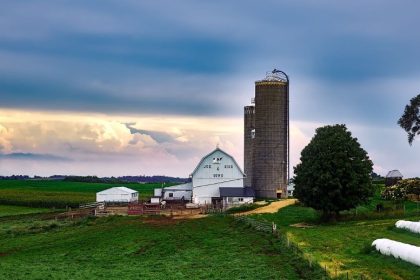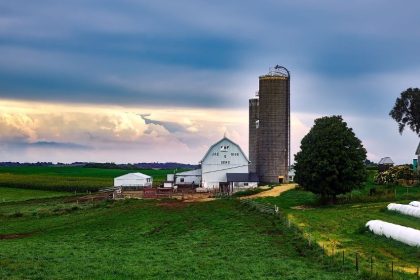Governors Outline Farm Bill Priorities in Letter to Congress

WASHINGTON — With Congress preparing to return to Washington, the National Governors Association has weighed in with a lengthy list of priorities it believes should be considered when deliberations over the next farm bill begin next week.
In a letter to the chairs and ranking members of the Agriculture Committees in both the House and Senate, Govs. Brad Little, of Idaho, and Albert Bryan, of the U.S. Virgin Islands, say much has changed since the last reauthorization of the farm bill in 2018, and their proposals highlight “the important role farm bill programs play in strengthening our communities.”
They note that since 2018, inflation has made it harder for farmers and ranchers to keep their products at an affordable and competitive price, and that consumers and recipients of food assistance have seen their buying power dwindle.
“Global markets have also changed significantly, and today we are more acutely aware of the important role played by American producers to secure the food supply chain,” Little and Bryan write.
“At the same time, employers in the agriculture sector face workforce shortages and challenges, which stand to be exacerbated in the coming years as farmers and ranchers retire. … A new farm bill should reflect these new realities.”
The lengthy list of the governors’ priorities include the following:
Commodities
- Continued support for the Price Loss Coverage and Agriculture Risk Coverage programs and urging consideration of adjusting reference pricing to reflect recent changes in crop prices.
- Disaster assistance programs that provide certainty to producers in times of emergency situations and urge improvements to programs to ensure assistance is timely, adaptable and tailored to their specific needs to protect agricultural productivity.
- Maintaining the Dairy Margin Coverage Program and recommending increasing Tier 1 coverage as well as increasing the margin pricing index. “Doing so will provide greater certainty to dairy producers when faced with unforeseen challenges,” Little and Bryan write.
Conservation
- Allowing state conservation entities greater levels of autonomy in their conservation practices, as conservation programs are overburdened, resulting in significant program backlogs and slow decision making, except when the conservation goal requires multistate cooperation.
- Increased investment in conservation programs, specifically the Environmental Quality Incentives Program, the Conservation Stewardship Program, the Regional Conservation Partnership Program, State Forest Stewardship Programs, and the Conservation Reserve Program.
- Continued funding for technical assistance to assist landowners in implementing conservation and land stewardship efforts.
- Continued funding to strengthen invasive species detection and surveillance, identification, threat mitigation and outreach, especially for culturally significant species.
Trade
- Robust investment in the Market Access Program. Increased investment will help pay for itself through greater market access to foreign consumers, which will yield greater income for American producers and distributors and is vital in the sharing of our valuable crop commodities worldwide.
Nutrition
- Maintaining support for nutritional assistance programs, especially the Supplemental Nutrition Assistance Program.
- Expanding SNAP benefits to all 55 states and territories, continuing support for SNAP funding and encouraging state and territorial flexibility to ensure equal access to affordable, nutritious food for all Americans.
- Administrative flexibility in implementation of nutrition assistance programs and urging Congress to consider ways to streamline application processes, so that assistance can reach communities with the greatest level of need in a timely manner.
- Continuing the SNAP Employment & Training Program and recommend strategies that will encourage work and support families, such as connecting recipients to Workforce Innovation and Opportunity Act and labor exchanges and other avenues to avoid and mitigate benefits cliffs.
Credit
- Congressional efforts to continue providing credit through the Farm Credit System and the Farm Service Agency, as the two respectively provide access and opportunity to agricultural entrepreneurship and support family farmers.
- Continue funding for the Beginning Farmer and Rancher Development Program, ensuring that new farmers and ranchers can fill the void left by those who are aging out and retiring, thus setting up the next generation for success in the agricultural sector.
Rural Development
- The governors say they are eager to deploy funding from the Infrastructure Investment and Jobs Act to help build out broadband to reach rural communities and urge Congress to continue its support for the Rural Broadband Program, the Community Connect Program, and the Distance Learning and Telemedicine Program in the farm bill. “These programs, in addition to the funding provided in the various COVID-relief packages, proved vital for rural communities during the pandemic and remain vital today,” Little and Bryan write.
- Continued funding of rural business programs, such as the Intermediary Relending Program and the Rural Innovation Stronger Economy Program, with the aim of fostering business development and expansion in rural communities.
- Improved workforce housing supply and affordability, and support for the continuation of the Rural Housing Service programs. In order to have access to a robust rural workforce, workers must be able to afford to live in the communities where they work.
- Continued funding for the water, waste and environmental programs to support safe drinking water and sanitary waste disposal systems. This is especially important as communities seek to offset the harm caused by per- and polyfluoroalkyl substances.
Research
- Increased funding for agricultural research and extension programs, with a specific focus on bolstering the safety and security of the food system, fighting pest and crop diseases, and safeguarding our natural resources.
Forestry
- The governors say they value Good Neighbor Authority projects and urge Congress to broaden the flexibility and eligibility of such projects. These projects enhance states’ capacity to work collaboratively with neighboring states to improve species’ habitats, enhance watersheds and mitigate the risks posed by hazardous wildfire fuels.
- They also support removing the 2023 sunset date pertaining to the treatment of revenues generated through the sale of timber products under a good neighbor agreement.
- New funding authorization for statewide assessment and strategies for forest resources that would provide flexible funding for state forest action plan implementation, allowing state forestry agencies to address the most critical forest management priorities within their respective boundaries.
- More accurate and inclusive definition of “at-risk community” and empowering states, territories, tribes and regions to determine which communities are at the greatest risk of wildfire.
- An “all-lands” approach to reforestation and urging Congress to create an authorization of appropriations for the USFS Reforestation, Nurseries and Genetic Resources Program. “Congress should also provide support to federal, state, tribal, and private nurseries and seed orchards through technical assistance and research, providing collaborative agreements and cooperative efforts; and to support seed collection and storage and tree nursery expansion, including the purchase of land, building construction and equipment and workforce development,” Little and Bryan say.
Energy
- Continued funding for agriculture-based renewable energy programs that focus on increasing energy efficiency and developing bio-based energy solutions. These programs encourage and support rural economic development, environmental improvements and energy security.
Horticulture
- Increased funding for the Specialty Crop Block Grant Program to continue to enhance the competitiveness of specialty crops.
Crop Insurance
- Governors support the federal crop insurance program and urge Congress to expand crop insurance access, which protects farmers from the vulnerability of agricultural livelihoods to natural disasters, helping build a safety net against massive losses, and allowing them to recover and rebuild in the aftermath of such tragedies.
Miscellaneous
- Governors support mental health programs that offer assistance to agricultural producers, workers and their families, such as the Farm and Ranch Stress Assistance Network, and emphasize the importance of destigmatizing access to mental health resources for farmers, ranchers and other agriculture-related occupations.
- They are also urging Congress to prioritize expanding programs aimed at preventing and managing animal diseases and to create a more comprehensive plan that emphasizes early disease detection, robust surveillance, effective prevention measures and swift response capabilities.
- They also seek federal support for urban farmers and updating the definition of “urban farming” to include a broader range of agricultural activities that take place within urban areas, such as community gardens and nonprofit community food growers, enabling a more comprehensive representation of urban producers.
- The governors are also urging Congress to avoid preempting state-level laws regarding agriculture production. “States succeed when the federal government avoids granting a private right of action against states that maintain their own production or manufacturing standard on agricultural products,” Little and Bryan write.
“The next iteration of the farm bill is an opportunity for Congress to reinforce its support for the states, territories and communities we represent, specifically rural and urban communities, farmers, ranchers and those in need of food assistance,” the letter writers continue. “Doing so will further bolster the more than 23 million jobs supported by the U.S. food and agriculture sector, which provide nearly $1 trillion in wages annually to American households.”
Dan can be reached at [email protected] and @DanMcCue
























